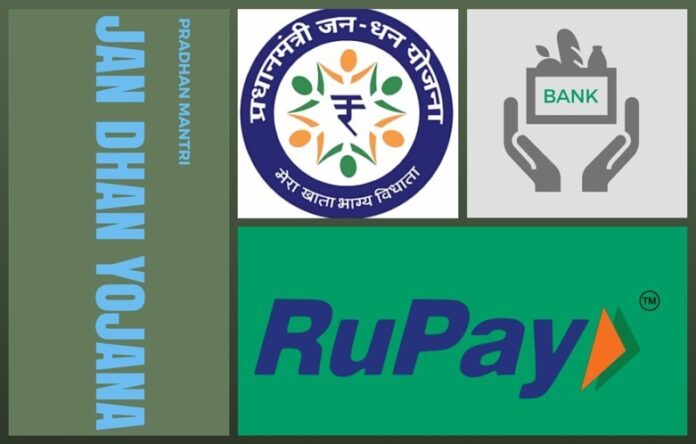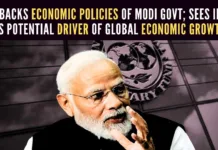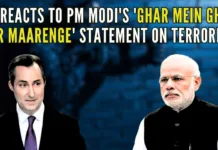
Priyanka Srivastava
Pradhan Mantri Jan-Dhan Yojana (PMJDY): India closing towards Financial Inclusion
PMJDY is a welcome step by Modi Government to include the under-privileged people of India into the banking system by providing them bank accounts and debit cards.
Prime Minister Narendra Modi launched PMJDY as a National Mission for Financial Inclusion to ensure access to financial services, namely Banking/ Savings & Deposit Accounts, Remittance, Credit, Insurance and Pension in an affordable manner.
The scheme is aimed at ensuring that every family has at least one bank account. It focuses on coverage of households as against the earlier plan which focused on coverage of villages. It focusses on coverage of rural as well as urban areas. Earlier plan targeted only villages above 2000 population while under PMJDY whole country is to be covered by extending banking facilities in each Sub-Service area consisting of 1000-1500 households such that facility is available to all within a reasonable distance, say about 5 km.
The Salient Features of the program are:
- Conceived with the objective of financial inclusion of the poor and rural population giving them dignity and financial independence
- Has objective of covering all households in the country with banking facilities and having a bank account for each household
- Financial literacy has been accorded priority under the PMJDY. A standardized financial literacy material has also been prepared in regional languages to create awareness about Yojana. An estimated 7.5 crore households with at least one account would be covered under this Yojana.
- With a bank account, every household gains access to banking and credit facilities. This will enable them to come out of the grip of moneylenders, manage to keep away from financial crises caused by emergent needs, and most importantly, benefit from a range of financial products
- As a first step, every account holder gets a Rupay Debit Card with Re 1 lakh accident cover. Those opening accounts under PMJDY till 26th January, 2015 would also get life insurance cover of Rs 30,000. In due course, they are to be covered by other insurance and pension products.
Highlights of the PMJDY:
The mission mode objective of the PMJDY consists of six pillars. During the first year of implementation under Phase I (15th August, 2014-14th August,2015), three pillars namely:
- Universal access to banking facilities
- Financial Literacy Programme
- Providing Basic Banking Accounts with overdraft facility of Rs 5000 after six months and RuPay Debit card with inbuilt accident insurance cover of Rs. 1 Lakh and Rupay Kisan card, will be implemented.
Phase II, beginning from 15th August 2015 up to 15th August, 2018 will address:
- Creation of Credit Guarantee Fund for coverage of defaults in overdraft accounts
- Micro Insurance ; and
- Unorganized sector Pension schemes like Swavlamban.
In addition, in this phase coverage of households in hilly, tribal and difficult areas would be carried out. Moreover, this phase would focus on coverage of remaining adults in the households and students.
Special Benefits under PMJDY Scheme are:
- Interest on deposit can be availed
- Accidental Insurance cover up to Rs 1 lakh can be claimed
- No minimum balance is required
- Life Insurance cover of Rs. 30,000 can be availed
- Easy transfer of money across India
- Beneficiaries of Government Schemes will get Direct Benefit Transfer in these accounts
- After satisfactory operation of the account for six months, an overdraft facility will be permitted
- Access to pension , insurance products
- In order to avail accidental insurance cover, Rupay Debit Card must be used at least once in 45 days
- Overdraft facility up to Rs. 5000 is available in only one account per household, preferably for the lady of the household
- Account can be opened in any bank branch or Business Correspondent (Bank Mitr) outlet with zero balance. However, if the account-holder wishes to get cheque book, he/she will have to fulfill minimum balance criteria.
(As per printed version of INDIA 2015: A Reference Manual, Min of Information & Broadcasting, Govt. of India)
Former United Nations Secretary-General Kofi Annan, on 29 December 2003, said:
“The stark reality is that most poor people in the world still lack access to sustainable financial services, whether it is savings, credit or insurance. The great challenge before us is to address the constraints that exclude people from full participation in the financial sector. Together, we can and must build inclusive financial sectors that help people improve their lives.”
– Kofi Annan, Former Secretary-General of United Nations on December 29, 2003
Financial inclusion of the un-banked masses is a critical step that requires political will, bureaucratic support and dogged persuasion by the Reserve Bank of India (RBI). It is expected to unleash the hugely untapped potential of the bottom of pyramid section of Indian economy. Perhaps, financial inclusion can begin the next revolution of growth and prosperity.
- Prime Minister Narendra Modi: A Gujju businessman who does not invest his precious time for a losing battle - April 13, 2024
- NIA arrests two accused Shazib and Taahaa in Bengaluru’s Rameshwaram Cafe blast case from Kolkata - April 12, 2024
- National Herald scam: Adjudicating Authority upholds Rs.752 crore assets attached by ED - April 11, 2024











Balanced and beautiful analysis…